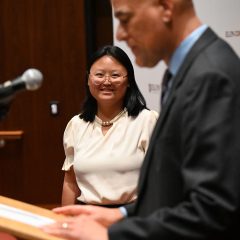In collaboration with researchers from Penn State University, the assistant professor of communication design investigated if users consider ChatGPT as trustworthy as other online information sources, such as Google and Wikipedia.
Cheng “Chris” Chen’s new research examining the trust levels of ChatGPT-generated content was recently shared at the 2024 Association of Computing Machinery CHI Conference on Human Factors in Computing Systems, a premier international conference of human-computer interaction. This year’s ACM CHI Conference was held May 11-16 in Honolulu, Hawaii.

The assistant professor of communication design, who is a prolific researcher on topics regarding social media, mobile media addiction, AI and generative AI, worked in collaboration with three researchers from Penn State University. Together the quartet investigated if users consider ChatGPT as trustworthy as other online information sources. The group’s final research is titled “Do We Trust ChatGPT as much as Google Search and Wikipedia?”
Chen and her collaborators – Yongnam Jung, Eunchae Jang and S. Shyam Sundar – organized five focus groups and one interview with 14 total participants to better understand how users perceive content from generative AI tools. The researchers learned that not all users have confidence in ChatGPT-generated information, especially in comparison to Google Search and Wikipedia. The focus groups and interview also shed light on the primary psychological considerations when trusting an online information source, namely perceived gatekeeping, and perceived information completeness.
Jung virtually presented the group’s findings at the ACM CHI Conference.

Since her arrival at Elon in fall 2022, Chen has published a substantial amount of content delving into the social and psychological effects of media technologies, ranging from AI to mobile phones. In 2023, Chen completed three peer-reviewed articles in publications, including New Media & Society and Behavior & Information Technology, as well as three conference presentations.
Chen’s academic pursuits earned her the School of Communications’ Excellence in Scholarship Award in April. To help supplement her research, Chen has received funding from the Academic Technology Committee, new faculty summer research grant, the Center for Writing Excellence, Writing Across the University, the Center for the Advancement of Teaching and Learning, and the Department of Communication Design.
About the conference
The ACM Conference on Human Factors in Computing Systems (CHI) series of academic conferences is widely considered the most prestigious in the field of human–computer interaction and is one of the top-ranked conferences in computer science. It is hosted by ACM SIGCHI, the special interest group on computer–human interaction. CHI has been held annually since 1982 and attracts thousands of international attendees.


